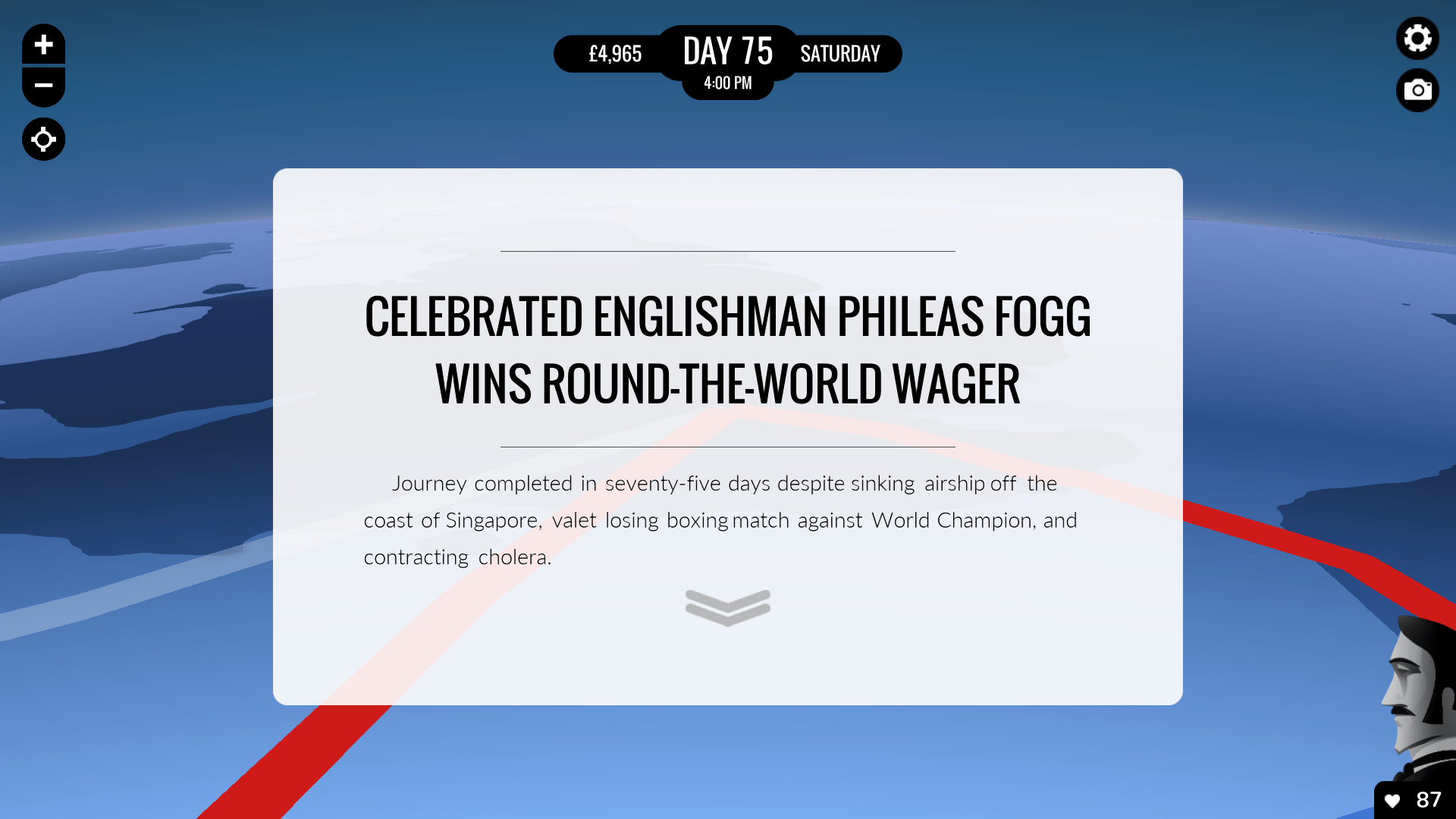
Having read the French version of the story Le Tour Du Monde En 80 Jours, I was quite excited for this game. The lack of an exposition was an interesting choice, perhaps because the developers expected players to know the story before coming in. Even despite knowing the story, I was frazzled by the lack of exposition in 80 Days. The game immediately throws you into the chaos of timed gameplay and decision-making. There was also no tutorial section on how to play the game, probably to force us to figure out through experience how everything works, just as the characters would have to. It took me many missed departures and trips to understand how the UI works, how conversations and narratives help expand the paths you can take, and how to plan around the timer and plan destinations to optimize trade profits. Some of my friends unfamiliar with the story disliked this game, which I think largely stems from the way that not knowing the story background makes it harder to connect with the characters and view their goals as yours. I believe a few sentences on the characters and the wager could have helped players enjoy the experience more.
The character of Passepartout was designed to subvert the concept of “white protagonism”, as explained by Meghna Jayanth in her keynote speech. He is the servant of Monsieur Fogg. His needs are never put before those of his master’s. To fulfill his role is to always consider how he can best assist Fogg in his journey. This could be seen in the way only Fogg has a “health” meter, rather than Passepartout, who is the player character. In order to make arduous trips, we are incentivized to maintain good relationship with and take care of Fogg, for only his health matters in-game. Additionally, Passepartout’s subservient role as well as his whiteness are seen in his interactions with others. He was sometimes denied conversation (information) due to his servant status. His euro-centric perspective is also seen in the well-intentioned but naive questions he asks nonwhite people, however, his inquisition paints a better picture of the world. He asked how a previously enslaved man isn’t angry to be emancipated yet still work as the servant of the same family. We also rode the airship of a Mutsun tribeswoman captain, who talked about taking to the skies because their tribal land was taken from them, but the skies are free to roam, not yet partitioned by empires into their territories. The portrayal of colonization and nonwhite people in this steam-punk version of the world is a sad parallel with our history, struggles that Passepartout or Fogg do not have to deal with himself except in passing encounters with these characters.
For most of the journey, blindly picking the first option yielded exactly what I wanted. Other times, it was unclear what the best option is. There were many places where I chose an option expecting a good outcome but turned out disastrous, like how on one airship, I tried to stop the best mate from shooting the captain and ended up sinking the airship (and thought we were going to die). In these ways, the player is limited in their agency under the programming of the game. However, Passepartout essentially dictated the entire course of the game for both Fogg and himself, managing the funds and exploring/planning options for travel, as well as using Fogg’s dignified status to bring us benefits. His fancy Englishmen jacket negotiated countless early departures for free. In this way, Passepartout essentially held the privilege that his master did – forming one protagonist with the two of them. Passepartout might be an extension of Fogg, but from the player’s perspective, Fogg is passive and dependent on us and therefore an extension of Passepartout. Though providing a fresh perspective as the servant/side-kick, Passepartout still enjoys many privilege of a white protagonist.
Overall, I did not expect to enjoy a text-based game as much as I did. The multitudes of paths you can take, the different people you meet, the pleasure in profiting off items you procure in previous destinations, and the humor in the narrative made it an educative and addicting experience.


Hi Felicity. Thank you for your blog post. It was super interesting to read about your experience. I personally also agree that the UI was a little difficult to navigate at first, and also thought it was cool that you pointed a potential reason for it. As for your analysis of White Protagonism within the game, I agreed that giving Fogg a servant or assistant that was also white helped subvert it somewhat, but still leaves Passepartout as a white man who benefits from the privileges of his character. Overall, your post was humorous and elegantly written. I’m glad you had a good time playing.
Hi Felicity,
Thank you for your post. I liked how you mentioned that you were familiar with the literature for 80 days prior to gameplay and agree that being more familiar with each character prior to game play would enhance the play through. You make a great point about how only Fogg’s health meter is present in the game and how Passepartout’s status as a servant affects the themes of the game.